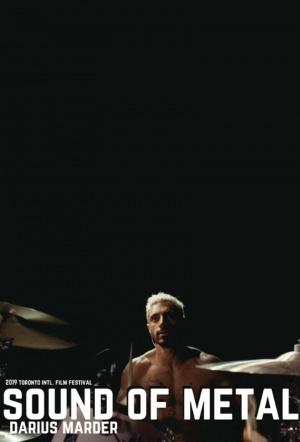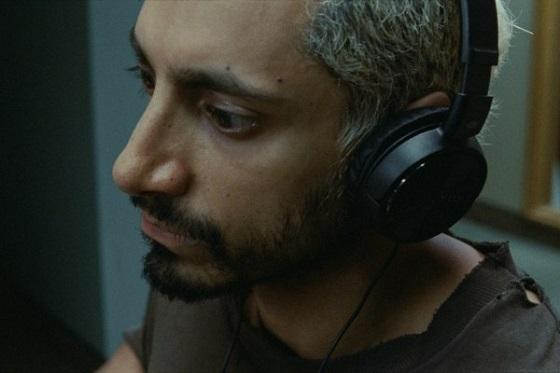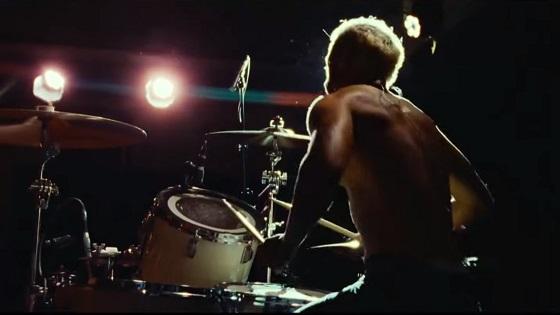

[Rating: Solid Rock Fist Up]
Opens at Screenland Armour November 20. Available on Amazon Prime Video December 4.
What does a person do when the things that are anchoring them on the right side of the abyss are taken away? That is the question at the core of writer/director Darius Marder’s newest film, Sound of Metal, which explores not just the struggle of addiction, but the addiction of struggle. Somewhat scattered in its sense of time and place, the film nevertheless transcends its genre and narrative expectations to craft a story that is true to its characters and the nuanced communities it showcases.
Ruben (Riz Ahmed) and Lou (Olivia Cooke) are a post-modern electro-punk duo living a semi-bohemian life together in a Winnebago that serves as their home/tour bus. The couple are both four years sober and seem to use their music and relationship as something of an elixir against their personal demons, which never seem too far away based on their frenzied commitment to staying mobile and busy. Things appear to be going well until the pair’s world is turned upside down when Ruben begins to lose his hearing, which a doctor diagnoses as permanent and irreversible.
Always in danger of relapsing on his very best days, and falling rapidly into a very dark emotional state, Ruben reaches out to his sponsor, who directs him and Lou to a deaf community that works with addicts. A sort of recovery commune that also has a school for the deaf on its grounds, it seems just the ticket for Ruben until he learns about the fine print. Ruben will have to go it alone during his stay at the commune, without Lou or any phone/internet access to her, which means the carefully cultivated routines he’s kept up to remain sober will be taken from him.

The audience learns that Ruben’s sobriety is tied to a number of things, not the least of which is his admission that he is an addict and needs to actively work to overcome that affliction. This is something he is accustomed to not just on a practical level with his exercise routines, drumming, nomadic lifestyle, and relationship, but also his mental approach to what he’s accepted as a problem. His loss of hearing challenges the surface level practicalities in the same way that his addictions did (he can’t function the way he wants to), but at the commune, Ruben finds that his biggest hurdle is one of perspective.
Most recovery programs begin with an acceptance of the fact that the addict has a problem, yet for the rest of the community at the commune, deafness isn’t something to be overcome. The head counselor, Joe (Paul Raci), explains that unlike a traditional recovery program, the people at the commune don’t see their hearing impairment as a handicap, but rather a stepping stone towards a new and equally rewarding phase of life. Ruben’s struggle, then, is to reframe his very approach to life, as he can no longer get by on his old methods (Lou and the music) and his newest hurdle doesn’t abide by the same rules that saw him through his last crisis. Indeed, the first step in this new recovery is for Ruben to admit that as far as his hearing is concerned, he doesn’t have a problem.
Marder, who co-wrote the script with Derek Cianfrance, isn’t screwing around with the themes or subject matter, here, and jumps into the complicated world of addiction and hearing loss with both feet. Sound of Metal wisely keeps its story focused on just one man’s journey and what works/doesn’t work for him, teasing at a few larger truths, but never supposing to advocate for any one of them as a universal balm. For Ruben, his struggle is a search for stillness in a world that he endeavors to keep spinning fast enough so that it can’t catch up to him or his cravings. This worked for a few years, as his constant movement with Lou and his active work to sustain that relationship acted as a new addiction: something to keep him busy and off of the bad stuff. In this way, Ruben never allowed himself to slow down long enough to get drawn into his addictions, yet the onset of his hearing loss acts like a strong wind that collapses his house of cards recovery.

The film works because this struggle is thoughtfully constructed, but it would just as easily fall apart on-screen without the commanding, emotionally charged work of Ahmed, who dominates every single scene in which he appears. When the audience meets him, he’s a frantic ball of controlled energy laser-focused on his protein shakes, tour schedule, and calisthenics routines which Ahmed underpins with just a hint of desperation. This is a man who has battled intense and unrelenting demons, and when that gust of wind arrives to disrupt the carefully arranged cards, it’s not entirely surprising that the guy goes to pieces.
Ahmed finds a harmonious balance between Ruben’s internal panic and frustration arising from his new condition with a startling sense of fulfillment once he begins to learn sign language and integrate into his new community. It’s a credit to the script and Ahmed’s work in the picture that Ruben’s most desperate moment isn’t when he learns that his hearing is gone, but rather when he realizes he might be able to live with that: that his addiction to movement, to the struggle, isn’t necessary. It’s a powerful moment and leads to a 3rd act that is both heartbreaking and appropriate to all that’s come before. A solid script, transportive sound design, and an awards-worthy leading performance by Ahmed put Sound of Metal into the best-of-2020 discussion, even if the story sometimes skimps on its presentation of time and place (the sense of geography of the film leaves a lot to be desired, as does its presentation of how much time has passed between segments/scenes).
Concerned with the ways that people process grief, addiction, and adversity, Marder’s film isn’t content to scratch the surface with easy to consume parables or lessons, committing to just one man’s story and how he processes his situation. Indeed, the Sound of Metal rings true.





Comments on this entry are closed.